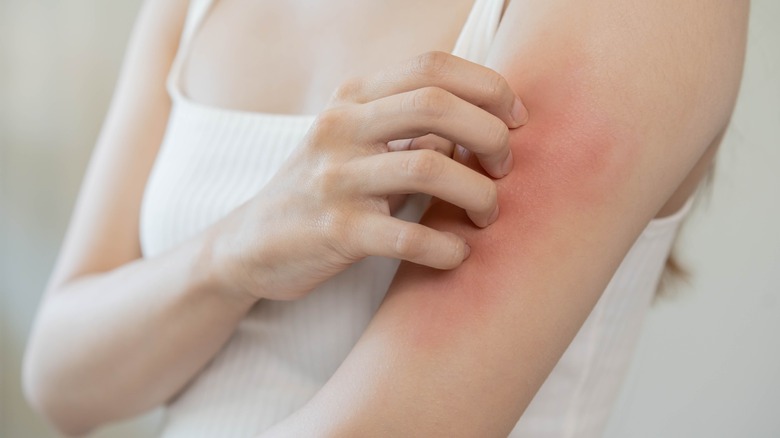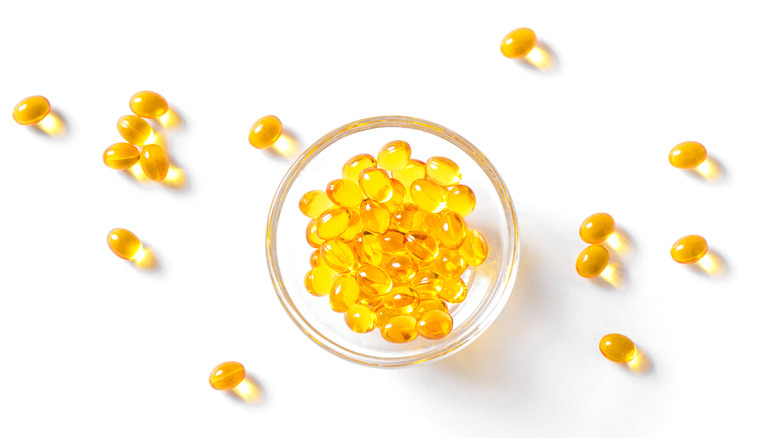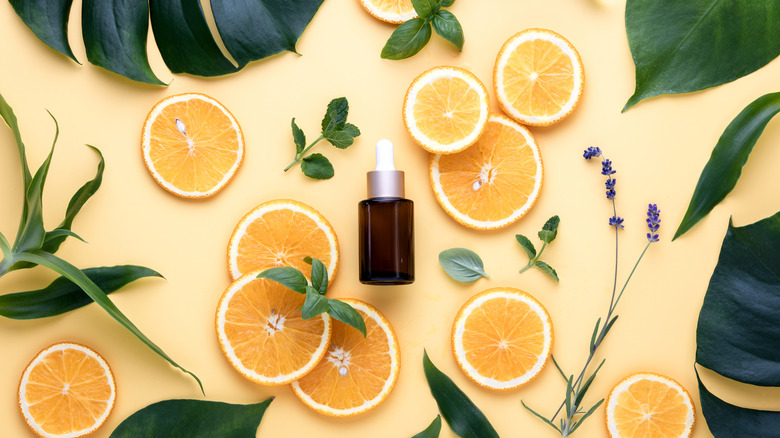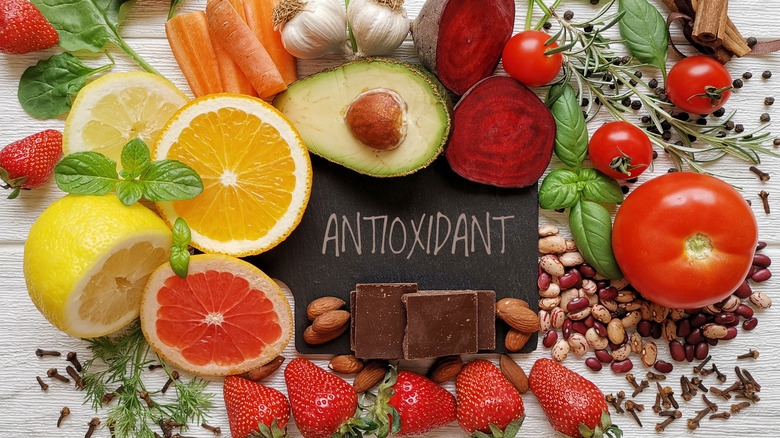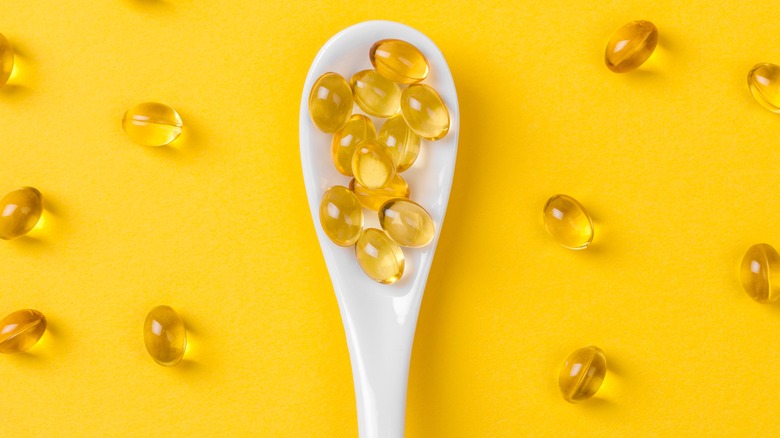The 5 Best Types Of Food To Eat For Itchy Skin
Itching, also known as pruritus, is a common skin problem that can be unbearable, regardless of which part of the body is affected. Too much itching can lead to various symptoms, including redness, stretch marks, and blisters (via the Mayo Clinic).
According to the Cleveland Clinic, various types of pruritus exist — the categorization of each one depends on the location or cause of itching. For example, brachioradial pruritus occurs on the upper arm after nerve damage, while nocturnal pruritus occurs at night and is caused by a skin irritant or medication. Other forms include pruritus ani (caused by hemorrhoids), senile pruritus (caused by skin changes in people over 65), and uremic pruritus (linked to renal disease), per the Cleveland Clinic.
According to the American Academy of Dermatology Association (AAD), some possible causes of pruritus include dry skin, allergies, parasites, bug bites, or skin conditions like psoriasis and eczema (atopic dermatitis). Other more serious conditions include kidney disease, HIV, and diabetes. In many cases, itchy skin goes away on its own, according to Healthline. Serious cases will require the assessment of a certified dermatologist for effective diagnosis and treatment.
Regarding treatment, corticosteroids can be applied directly to the skin to relieve itching (via MedicalNewsToday). Another treatment is phototherapy, which exposes the skin to a considerable amount of ultraviolet (UV) light. Besides these treatment options, certain foods can help relieve itching. Here are the five best types of food to eat for itchy skin.
Foods that contain omega 3 and 6
According to MedlinePlus, polyunsaturated fats, such as omega 3 and 6, are essential fatty acids that boost brain function and cell growth. Fatty acids are commonly present in the body. However, because the body doesn't make enough essential fatty acids, supplementing through food is essential, per MedicalNewsToday.
Omega-3 fatty acids are nutritional fats found in plants and marine life that contribute to the basic health of all cells in the body (via MedicalNewsToday). Omega-6 fatty acids are also present throughout the body, but they can only be sourced from plants and seed oils (via WebMD).
Even though polyunsaturated fats have been significantly researched over the years, Healthline argues that the skin benefits are less widely known. For instance, omega 3 can protect the skin against the sun's harmful UVA and UVB rays, making your skin resistant to sunburns. Omega-3 foods are an effective treatment for inflammation and can reduce the severity of acne.
According to a 2022 study published in the International Journal of Molecular Sciences, omega-3 foods can have suppressive and anti-inflammatory effects. This makes them ideal for treating conditions like atopic dermatitis, which is associated with extreme itching. The same applies to omega-6-rich foods. People with eczema and dry skin can consider omega-6 as an effective treatment option.
Reliable sources of omega-3 include salmon, mackerel, and omega-3 supplements like cod liver oil, per the Office of Dietary Supplements. A deficiency of omega-3s can cause a swollen, itchy rash.
The benefits of probiotics
According to the National Center for Complementary and Integrative Health, not all bacteria and microorganisms tagged as germs are harmful. Contrary to what some think, many microorganisms can help digest food and produce essential vitamins, which destroy disease-causing cells. Probiotics are similar to microorganisms living in the body. Also known as good bacteria, probiotics come with various health benefits.
A 2020 review published in the British Journal of Dermatology found probiotics to be effective for certain inflammatory conditions like eczema, acne, and even skin cancer. Fermented foods are also high in probiotics. As Healthline notes, some common fermented foods include yogurt, kefir, sauerkraut, and tempeh. Also, certain cheese types can be a great source of probiotics.
Some probiotics are available as supplements. However, you may have to consult a health expert before applying any probiotic supplement to a skin condition. As MedicalNewsToday notes, regulatory bodies like the U.S. Food and Drug Administration (FDA) do not consider probiotic supplements to be medications. This is due to the uncertainty about the content of the different probiotic supplements on the market.
Foods that contain vitamin C
Vitamin C is a water-soluble vitamin essential for the body's growth and development (via MedlinePlus). According to the Harvard Medical School, vitamin C is also an important antioxidant that fights harmful free radicals that can damage your skin. However, the body can't make vitamin C on its own, hence the importance of supplementation, per MedlinePlus. The recommended daily amount for vitamin C is 75 milligrams for women and 90 milligrams for men (via Mayo Clinic). A 2017 review in the journal Nutrients notes that vitamin C can help relieve inflammation, which is often associated with dryness and itching.
According to MedicalNewsToday, fruits and vegetables, such as oranges, peppers, strawberries, and broccoli, are great dietary sources of vitamin C. Adding them to your diet can help you meet your recommended dietary intake. However, Healthline argues that there's no guarantee that the vitamin C in your diet directly goes to the skin. Therefore, using serums and other topical vitamin C products might be helpful if you want to enjoy the skin benefits associated with vitamin C. Beyond relieving itching, vitamin C products are known to reduce the appearance of eye circles and promote collagen production, which helps prevent skin sagging, per Healthline.
Foods high in antioxidants
According to the National Health Service (NHS), various environmental factors can also cause itchy skin. Some cases of itchy skin can be caused by free radicals, which stem from food and environmental allergens (via a 2013 study published in the Journal of Clinical and Diagnostic Research). One way to combat free radicals is by using antioxidants (via MedicalNewsToday). According to the National Center for Complementary and Integrative Health, antioxidants help prevent various kinds of cell damage in the body and come with health benefits. Their impact on the health and quality of your skin can't be understated. A 2021 study published in the Archives of Dermatological Research notes that topically applied antioxidants can penetrate the skin to neutralize free radicals. This can prevent cell damage and enhance the skin's natural antioxidant defenses.
According to MedicalNewsToday, the secret to healthy skin may depend on a person's diet. Examples of antioxidant-rich foods include green tea, which contains catechins, known to improve blood flow to the skin. This affords your skin enough fresh oxygen to maintain its quality. As indicated by the source, other healthy dietary sources of antioxidants include dark chocolate and almonds.
Foods that contain vitamin E
According to a 2014 review published in Advances in Nutrition, more than 90% of Americans don't consume enough vitamin E. As a fat-soluble nutrient, vitamin E has anti-inflammatory properties that support the immune system, cell function, and skin health (via Healthline). The vitamin also contains antioxidant properties, helping the body combat free radicals and toxins, per Healthline. A 2015 study published in the Journal of Research in Medical Sciences found that vitamin E may help reduce the dry and itchy symptoms associated with eczema and dry skin. Some foods contain high amounts of vitamin E, including sunflower seeds, spinach, almonds, peanuts, and avocados (via MedicalNewsToday).
Besides food, vitamin E is commonly used in skin care products and moisturizers to decrease itching and relieve dry, rough, and scaly skin (via WebMD). According to the Cleveland Clinic, vitamin E is a mainstay in moisturizers, as it softens the skin and protects cells from damage. When using moisturizers that contain vitamin E, it's important to stick to the guidelines on the package or consult with a certified dermatologist.

